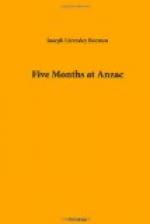THE DESTROYERS
After the torpedoing of the Triumph here, and the Majestic in the Straits all the big ships left and went to Mudros, as there was no sense in leaving vessels costing over a million each to the mercy of submarines. This gave the destroyers the chance of their lives. Up to this they had not been allowed to speak, but now they took on much of the bombardment required. They were constantly nosing about, and the slightest movement on the part of the Turks brought forth a bang from one of their guns. If a Turk so much as winked he received a rebuke from the destroyer. The Naval men all appeared to have an unbounded admiration for the Australians as soldiers, and boats rarely came ashore without bringing some fresh bread or meat or other delicacy; their tobacco, too, was much sought after. It is made up from the leaf, and rolled up in spun yarn. The flavour is full, and after a pipe of it—well, you feel that you have had a smoke.
THE INDIAN REGIMENTS
We had a good many Indian regiments in the Army Corps. The mountain battery occupied a position on “Pluggey’s Plateau” in the early stage of the campaign, and they had a playful way of handing out the shrapnel to the Turks. It was placed in boiling water to soften the resin in which the bullets are held. By this means the bullets spread more readily, much to the joy of the sender and the discomfiture of Abdul. The Indians were always very solicitous about their wounded. When one came in to be attended to, he was always followed by two of his chums bearing, one a water bottle, the other some food, for their caste prohibits their taking anything directly from




